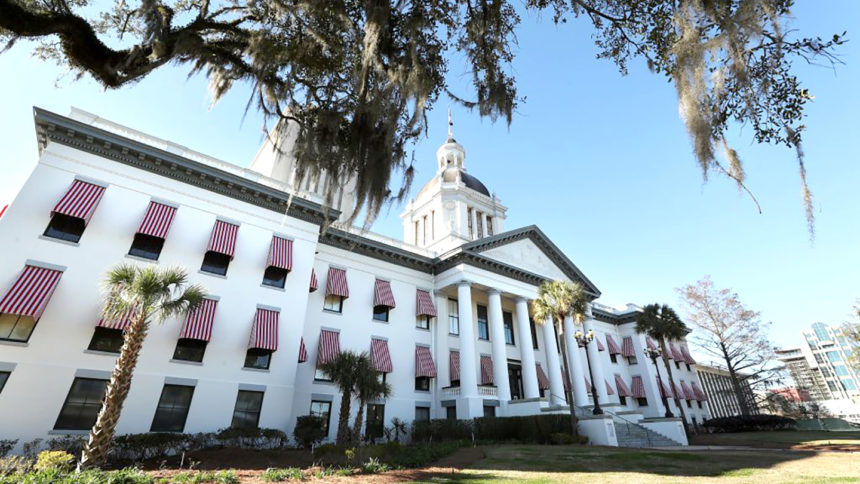
The Florida Capitol in Tallahassee, where the state Legislature on Wednesday voted to approve a bill pushed by Gov. Ron DeSantis that would allow fines for businesses over certain vaccination mandates. (Stephen M. Dowell/Orlando Sentinel/Tribune News Service via Getty Images)
A series of state bills aimed at dismantling employer COVID-19 vaccine mandates were signed Thursday by Florida Gov. Ron DeSantis’ desk, making the state the first to fine employers for requiring vaccinations.
The Florida Legislature passed the package of bills — dubbed the “Keep Florida Free” joint agenda, with DeSantis — in a special session on Wednesday “in response to the Biden administration’s unlawful federal vaccine mandates.”
Florida Assisted Living Association CEO Veronica Catoe told McKnight’s Senior Living the new legislation will actually help the current workforce crisis in long-term care as the industry is “already facing significant challenges, and forcing current or potential employees to be inoculated against COVID-19 will not necessarily make them comply.”
“All long-term care providers must take every possible step to protect the health of their residents, visitors and staff, but forced vaccinations could add to staffing pressures and jeopardize care,” Catoe said. “We will urge our members to comply with state and federal laws to the fullest extent possible.”
Catoe said she does have concerns where those laws may be in conflict, but is hopeful those conflicts will be resolved quickly.
SB 2B / HB 1B prohibits COVID-19 vaccination mandates by schools and local governments. Private employers are required to offer specific opt-outs for employees who refuse vaccination — a medical or pregnancy exemption, a religious exemption or an immunity exemption based on a medical test. The bill also allows employees to opt out of vaccine mandates and submit to regular testing and agree to wear employer-provided protective equipment in the workplace.
The Florida Department of Health is tasked with providing details about those opt-outs, which do not apply to school districts and local governments because they are prohibited by state law from requiring employee vaccination as a condition of employment.
Companies also face steep penalties if employees who are fired due to nonadherence to COVID policies are successful in challenges against those policies. Small businesses with fewer than 100 employees face a $10,000-per-violation penalty, whereas larger companies face a $50,000-per-violation penalty.
Employers have the option of reinstating the employee, with back pay, to avoid the fines. The bill also states that anyone fired for noncompliance is eligible for unemployment benefits.
The bill also allocates $5 million for the attorney general’s office to investigate violations and enforce penalties.
SB 4B / HB 3B, the Public Records / Employer COVID-19 Vaccination Policies bill, creates a public records exemption for information related to state investigations of company vaccine policies.
SB 6B / HB 5B, the Florida Occupational Safety and Health State Plan, creates a state Occupational Safety and Health Administration plan to “assert jurisdiction over occupational safety and health issues for government and private employees.”
The wrinkle with this bill, according to the Tallahassee Democrat, is any state program would have to be approved by OSHA itself and abide by any federal standards already in place.
SB 8B / HB 7B, Vaccination During Public Health Emergencies, removes the ability of the state surgeon general to order the vaccination of individuals during a public health emergency. The surgeon general still has the ability to order a person to be examined, tested, treated, isolated or quarantined for communicable diseases that have “significant morbidity or mortality and present a severe danger to public health.”
In May, DeSantis signed a bill that prevents state government agencies or businesses from requiring employees or customers to show proof of vaccination. The law went into effect in July.
Other states have requirements
According to LeadingAge, 25 states require vaccination for employees in various categories — 21 have specific requirements for healthcare workers, six have taken a “vaccinate or terminate” employment approach, and nine have passed laws banning employers from mandating vaccines for workers.
Nov. 12, Tennessee Gov. Bill Lee signed into law HB 9077 / Senate Bill 9014, which prohibits private businesses, governmental bodies and schools from requiring proof of COVID-19 vaccination from employees, job applicants and customers. Assisted living communities, residential hospice facilities and nursing homes are among the entities exempt from this ban.
Nov. 5, Alabama Gov. Kay Ivey signed SB 9 into law, requiring employers to use a specific exemption form — which is included in the bill — if mandating employee vaccinations. Alabama’s law does not exempt any specific employers or categories of employers subject to federal vaccination requirements.
State, federal conflicts have providers in crosshairs
Although the federal OSHA has suspended enforcement of its COVID-19 vaccination and testing emergency temporary standard amidst legal challenges, conflicting state and federal requirements leave many senior living providers caught in the crosshairs.
Senior living experts note that most providers already have implemented vaccination mandates, and they encourage their members to continue to vaccinate as many staff members as possible.
American Seniors Housing Association President David Schless called vaccination “the most reliable tool in our toolbox to keep staff and residents safe.”
“We know the preponderance of senior living operators have been moving towards vaccine mandates for several months, and while they are certainly aware of the challenges to the OSHA emergency temporary standard, we do not anticipate the court challenges having much of an impact for most providers,” Schless told McKnight’s Senior Living.
“Our concern is that these frontline caregivers continue to follow all of these ever-changing federal and state COVID-19 regulations at great expense but have received very little to no federal relief over these many months of the pandemic,” Argentum Senior Vice President of Public Policy Maggie Elehwany told McKnight’s Senior Living. “The federal government must provide more support for assisted living even as we continue to take every step necessary to protect our residents and staff.”
A LeadingAge spokeswoman said the association is following the situation closely to provide its members with guidance on the latest developments.




